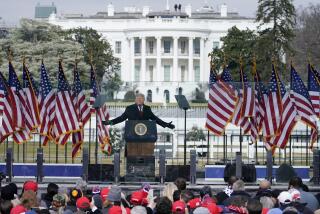Opinion: Nixon’s impeachment process began 45 years ago today. A reminder: Presidents don’t fall quickly
Forty-five years ago, on Feb. 6, 1974, the House of Representatives voted 410 to 4 to pass HR 803, authorizing the House Committee on the Judiciary to investigate whether sufficient grounds existed to impeach President Richard Nixon. The vote came nearly a year after the U.S. Senate created a select committee to investigate the Nixon campaign’s activities related to the Watergate scandal during the 1972 presidential election.
While such an overwhelming vote could be considered a bipartisan gesture, it came after months of quarrels between the Democrats and Republicans, whose leaders ultimately concluded that there was no other way to determine the full extent of the Nixon administration’s misbehavior.
What they did know was this: On Jan. 30, 1973 — 10 days after Nixon was inaugurated for his second term — G. Gordon Liddy, a former Nixon aide and FBI agent, and James McCord, a one-time Nixon aide and former CIA agent, had been convicted for their role in spearheading the Watergate break-in. In April of 1973, the scandal reached the White House, where counsel John Dean was fired, and senior aides H.R. Haldeman and John Ehrlichman, and Atty. Gen. Richard Kleindienst resigned. Former presidential deputy assistant Alexander Butterfield revealed the existence of a secret taping system in the White House in July of 1973 (which became known as the “Nixon tapes”), but Nixon refused to turn the recordings over to the Senate or special prosecutor Archibald Cox.
Despite the wealth of evidence against the Nixon administration, the House vote was still controversial, including with the Los Angeles Times. The paper had long supported Nixon’s political rise, first as a U.S. House member and senator representing California, and then as Dwight Eisenhower’s vice president. Even after the infamous “Saturday Night Massacre” in October of 1973, when Nixon’s attorney general, Elliot Richardson, and deputy attorney general, William Ruckelshaus, resigned on the same day rather than fire Cox, The Times’ editorial board called the situation “an unnecessary crisis.”
Nixon had sought to shut down the investigation into Watergate, yet The Times still cautioned against impeachment. Meanwhile, an NBC News poll showed, for the first time, that a thin plurality of citizens supported impeaching Nixon — with 44% in favor and 43% against.
At the time of the House vote, The Times’ editorial board still did not believe that the case for impeachment was ready for trial.
It took The Times until May of 1974, just one day after the House Judiciary Committee began impeachment hearings, to call for Nixon’s impeachment.
Enter the Fray: First takes on the news of the minute »
Forty-five years later, the question of impeachment looms again, this time over Donald Trump, the 45th president of the United States. In July of 2017, Reps. Brad Sherman (D-Northridge) and Al Green (D-Texas) introduced an article of impeachment (HR 438) against Trump, which ultimately went nowhere. Followup efforts have been equally unsuccessful even though the Democrats have taken control of the House. Instead, Democratic leaders have tamped down impeachment talk, arguing that it is important to allow special counsel Roberts S. Mueller III to finish his investigation.
Political history does counsel this kind of caution. Along with The Times, many Republicans in Congress supported Nixon until the Supreme Court ordered Nixon to release the “smoking gun” tapes that proved he had ordered a cover-up of the Watergate crimes. Nixon resigned on Aug. 9, 1974, four days after he released the tapes.
Mueller’s 18-month investigation of links between the Trump campaign and Russia has already netted 199 criminal charges, 37 people and entities charged, seven guilty pleas, and four prison sentences. But there has been no smoking gun equivalent implicating Trump thus far.
Jason D’Andrea is a public affairs fellow at Coro Southern California. His opinions are his own. Email him at coro.dandrea@gmail.com
More to Read
A cure for the common opinion
Get thought-provoking perspectives with our weekly newsletter.
You may occasionally receive promotional content from the Los Angeles Times.






